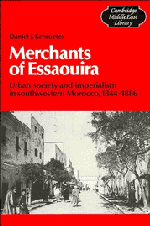Book contents
- Frontmatter
- Contents
- List of illustrations
- Map 1 General map of Morocco
- Preface
- Notes on usage
- Abbreviations
- Chronology
- 1 Introduction
- 2 The royal port
- 3 Merchants of the Sultan
- 4 Port and bazaar
- 5 Beyond the walls
- 6 The politics of trade
- 7 Foreign intervention and domestic reforms
- 8 The struggle for the southwest
- 9 The people of Essaouira in precolonial times
- 10 The end of an era
- Appendix A Corcos collection: nineteenth-century Arabic documents (1843–83)
- Appendix B Population estimates of Essaouira
- Appendix C Balancing revenue and expenditure: accounts of the port
- Appendix D Trade statistics for Essaouira
- Notes
- Bibliography
- Index
8 - The struggle for the southwest
Published online by Cambridge University Press: 04 August 2010
- Frontmatter
- Contents
- List of illustrations
- Map 1 General map of Morocco
- Preface
- Notes on usage
- Abbreviations
- Chronology
- 1 Introduction
- 2 The royal port
- 3 Merchants of the Sultan
- 4 Port and bazaar
- 5 Beyond the walls
- 6 The politics of trade
- 7 Foreign intervention and domestic reforms
- 8 The struggle for the southwest
- 9 The people of Essaouira in precolonial times
- 10 The end of an era
- Appendix A Corcos collection: nineteenth-century Arabic documents (1843–83)
- Appendix B Population estimates of Essaouira
- Appendix C Balancing revenue and expenditure: accounts of the port
- Appendix D Trade statistics for Essaouira
- Notes
- Bibliography
- Index
Summary
For the Europeans, Essaouira was an opening to the interior of Morocco. It was the gateway to all the lucrative markets of Marrakesh and the southwest. For the makhzan as well, Essaouira was an outlet to the Sous. Quite apart from the increments gained from customs duties, Essaouira's commercial role was of great geopolitical importance for the central government. It made potentially dissident regions dependent on a town closely controlled by the central government. This became a crucial strategy in counteracting foreign inroads in the lands to the south.
Southern chiefs
The development of Essaouira greatly contributed to the rise to power of Sīdī Hāshim of Tazarwalt and Sheikh Bayrūk of Wad Noun. Both chiefs had agents in Essaouira who in turn marketed their goods in Europe. A French consul in Essaouira estimated that Bayrūk's annual profits amounted to about 610,000 piastres. The rising power of these southern chiefs presented the central government with a predicament. On the one hand, it was in the interests of the makhzan to preserve the commercial importance of these local powers in the Sous to assure the flow of traffic, but on the other hand, they also needed to curtail their influence. Yet efforts to reduce the influence of Bayrūk, and particularly, his more powerful rival, Sīdī Hāshim, tended to disrupt trade with Essaouira which ultimately worked against the interests of the makhzan.
- Type
- Chapter
- Information
- Merchants of EssaouiraUrban Society and Imperialism in Southwestern Morocco, 1844–1886, pp. 161 - 195Publisher: Cambridge University PressPrint publication year: 1988



